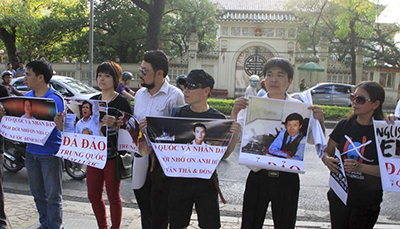What one hand gives, the other takes in Vietnam. Last October’s early release of jailed blogger Nguyen Van Hai, more commonly known as Dieu Cay, has proven to be an anomaly as authorities have subsequently ramped up their repression of other independent bloggers.
The latest victim of the crackdown is Nguyen Dinh Ngoc, a prominent blogger who was arrested after police searched his home in southern Ho Chi Minh City on December 27, according to news reports. An announcement on the city’s official police website said authorities would launch an inquiry into Ngoc’s “law-violating” activities without overtly mentioning his blogging.
In the weeks before his arrest, Ngoc had highlighted in blog posts and in comments to Radio Free Asia the cases of recently detained fellow bloggers Nguyen Quang Lap and Hong Le Tho. They were arrested on anti-state charges of “abusing democratic freedoms,” a criminal offense under Article 258 of Vietnam’s penal code. Press reports said Ngoc had also complained in a blog post before his arrest that his Gmail and Facebook accounts had been “hacked.”
If Lap and Tho are convicted under Article 258, a charge increasingly used by authorities against bloggers to stifle online dissent, they each face a maximum of seven years in prison. CPJ’s latest prison census, published last month, showed Vietnam held 16 reporters behind bars as of December 1, making the country the world’s fifth worst jailer of journalists. That high tally did not include the more recent arrests of Lap and Ngoc.
The three arrests within a matter of weeks dashed hopes raised by Dieu Cay’s early release that Vietnam’s government may be on the verge of loosening its grip on bloggers and freeing more jailed journalists to improve bilateral relations with the United States. The U.S. government had advocated strongly for Dieu Cay’s freedom and has predicated stronger strategic ties with Hanoi, including arms sales, on demonstrable progress on human rights.
The arrests of Tho and Lap, on the other hand, have been interpreted by some commentators as a possible diplomatic sop to China. Both bloggers posted critical commentaries about China, including posts on the Vietnamese government’s perceived as compromised approach to territorial disputes with China over islands and features in the South China Sea.
Vietnamese reporters at state-controlled newspapers told CPJ last year that China has become more sensitive to critical media coverage of its extensive commercial interests in Vietnam after deadly anti-China rioting in May 2014 damaged and destroyed Chinese-owned factories in the country’s central region. It’s widely held that Dieu Cay, who was bestowed with CPJ’s International Press Freedom Award while he was still in prison in 2013, was first imprisoned in part for his critical blogging about China.
The trigger for Ngoc’s arrest is not immediately clear, though some news reports have pegged it to his pseudonymous postings on the collective Danlambao blog site. In a mid-December interview with Radio Free Asia, Ngoc was quoted by name saying: “As we reach the end of 2014, many prisoners of conscience are suffering from harassment and torture … and despite the fact that the government has ratified the international convention against torture, there has been no improvement.”
Ngoc’s statement was made around the time Ta Phong Tan, a prominent jailed blogger and 2013 recipient of the U.S. State Department’s Women of Courage award, began a hunger strike to protest her mistreatment, according to a Danlambao blog post. The blog post quoted Tan’s sister, who had visited her on January 5 and said that Tan, who is serving a 10-year sentence for “disseminating anti-state propaganda,” appeared pale and weak, and was in dire need of medicine.
It’s precisely the type of news that Vietnam’s government persistently bids to black out and the sort of subject matter Ngoc was consistently highlighting in his critical reporting and commentary.
